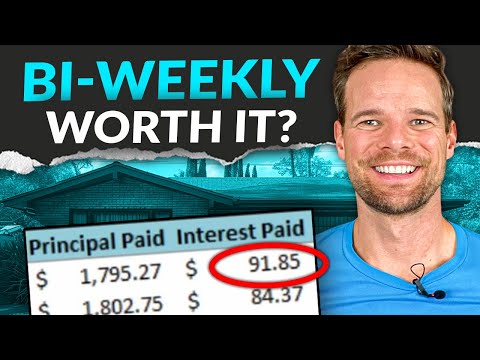Unlock the Benefits of Biweekly Mortgage Payments
Folks, we’ve all been there, staring at that mortgage statement and feeling like the balance is a mountain that’s nearly impossible to climb. But hold on to your hats, because there’s a strategy that could change the game for homeowners: biweekly mortgage payments. This little gem of wisdom could be the dynamite that helps you blast through your mortgage faster than you ever thought possible.
Diving into the nuts and bolts, biweekly mortgage payments work differently from the traditional monthly payments you’re likely used to. Instead of making one payment every month, you’ll make a half-payment every two weeks. Now, you might be scratching your head, but here’s the beauty of it: Since there are 52 weeks in a year, this means you end up making 26 half-payments – the equivalent of – wait for it – 13 full monthly payments each year! Essentially, you’re sneaking in an extra month’s payment annually, which can lead to significant savings and can slice years off your mortgage.
The potential benefits and savings are no joke. By embracing biweekly mortgage payments, you could be looking at paying off your mortgage in just over 24 years, with an interest rate of 6.5% and biweekly payments of $252. That’s about six years ahead of schedule! And the cherry on top? You’re likely to save a substantial chunk of change on interest. Now, tell me that doesn’t sound like a plan worth considering.

The Mechanics Behind Bi Weekly Mortgage Payments
Alright, let’s pop open the hood and look at the mechanics of these bi weekly mortgage payments. It’s like transforming your mundane monthly payment into a finely-tuned sports car accelerating down the highway of amortization.
Here’s the deal with the biweekly payment schedule:
The impact on your loan’s amortization can be pretty significant. It’s like you’re chipping away at your loan with a jackhammer rather than a chisel. And if you’re thinking, “Sign me up!” well, let’s talk turkey about setting this up. Give your lender or servicer a jingle to see if they offer a biweekly option. But watch out – some might charge a fee, or worse, they may not accept biweekly payments at all.
Don’t let that throw a wrench in your plans, though. If your lender is a party pooper, simply divide your monthly payment by 12 and make an extra principal-only payment each month, achieving the same effect without any confetti and balloons. It’s a DIY version, so to speak. And always, always make sure those extra payments are hitting the principal – you want your hard-earned dough reducing that balance, not just lounging around.

| Feature | Details |
|---|---|
| Payment Frequency | Biweekly (every two weeks) |
| Annual Payments | 26 half payments (equivalent to 13 full monthly payments) |
| Interest Rate Example | 6.5% |
| Payment Example | Biweekly payment of $252 |
| Total Payments in a Year | 26 half payments (13 full monthly payments) |
| Interest Savings | Significant reduction over the life of the loan |
| Time Savings | 5-8 years off a 30-year loan term |
| Cumulative Effect | Pay off mortgage about six years early |
| Interest Calculation Frequency | Daily |
| Lender Acceptance | Not all lenders accept biweekly payments; must confirm |
| Option if Lender Non-acceptance | Make one principal-only extra payment monthly |
| Extra Payment Allocation | Must ensure extra payments applied to principal |
| Prepayment Penalties | Must confirm the absence of penalties |
| Self-Implementation Method | Divide monthly payment by 12, add that amount to monthly due |
| Financial Impact | Save about $53,000 in interest on a 30-year mortgage example |
| Loan Term Impact | Trim about five years from a 30-year loan term |
| Lender Contact | Essential to confirm payment arrangement details |
Case Studies: Success Stories with Biweekly Mortgage Payments
Let’s spin some yarns of real-life folks, just like you and me, who’ve hit pay dirt with biweekly mortgage payments.
Picture this: Jennifer and Mike were saddled with a hefty 30-year loan. By switching to biweekly payments, not only did they shave about five years off their loan, but they also saved themselves a pretty penny—$53,000 in interest. Talk about a win!
Then there’s Kevin, a single dad who thought his mortgage was a life sentence. But, by buckling down on paying mortgage biweekly, he’s on track to own his home outright while his kiddo is still in high school. And the savings? Kevin’s laughing all the way to the bank, with a projected $30,000 less in interest payments.
We’re not just blowing smoke here; statistical data backs up these claims. The average homeowner can find themselves in a much friendlier financial position, building equity at super-speed and giving their future selves a high-five for being so financially savvy.

Debunking Myths About Biweekly Payments
Now, let’s take aim at some tall tales about bi weekly mortgage payments because misinformation can spread faster than a wildfire in a windstorm. First off, this isn’t some magic trick that doubles your payments; it’s just math. And it’s not the same as semi-monthly payments where you pay twice a month—that would be 24 payments a year, not 26.
Some folks worry that this biweekly hustle might tighten the ol’ budget belt too much. But if you plan it right, aligning payments with your paychecks, it’s smooth sailing. Remember, you’re not paying more each month, just splitting it differently.

Advanced Strategies for Maximizing the Impact of Biweekly Mortgage Payments
Now, for those who want to turbocharge their biweekly mortgage payments, listen up! Adding extra payments into the mix can supercharge your strategy like adding nitrous oxide to a drag racer.
Here are some nitro-boosted tactics:

Potential Pitfalls and How to Avoid Them
Sure, biweekly mortgage payments can be your golden ticket, but only if you avoid some booby traps along the way. Some pitfalls to dodge include:
Stay on your toes by reaching out to your lender and making sure you’ve got all your ducks in a row before making the leap. This isn’t a game of chance; it’s a strategic move.
Leveraging Biweekly Payments in Different Loan Scenarios
Depending on your loan type—be it FHA, VA, or conventional—biweekly mortgage payments can vary in flavor like different types of pie at a picnic. And the size of the slice (your loan term) also plays into the mix.
A 15-year loan is going to behave differently than a 30-year when you switch to biweekly payments, but both will benefit from those extra payments going into the principle. And if interest rates get a case of the yips or you’re considering refinancing, don’t fret. Adjust your biweekly payments accordingly and keep charging toward that payoff date like a bull after a rodeo clown.
The Future of Mortgage Payments: Trends and Innovations
The world of mortgage payments is revving up, and biweekly payments are cruising right along with the pack. Fintech solutions are sprouting up like spring daisies, making these payment strategies easier to manage and automate than a set-it-and-forget-it slow cooker.
We’ll likely see more innovations rolling out, making it even simpler for homeowners to stay on top of their mortgage game. Our guess? Biweekly payments will shift from being a nifty strategy to becoming the norm, like swapping from clunky typewriters to sleek laptops.
Conclusion: Mastering Your Mortgage with Biweekly Payments
Round up everything we’ve laid down: biweekly mortgage payments are a solid, strategic move to mastering your mortgage destiny. It’s about taking control, like grabbing the reins on a spirited horse and riding it home, rather than letting it drag you around the field.
You’ve got the facts, the strategies, and we’ve busted the myths. It’s clear that paying mortgage biweekly can be your ace in the hole for beating debt while padding your wallet.
Think about it, friends—this isn’t just smart economics; it’s about a shift in our cultural mindset towards proactive debt management. It’s time to flip the script on your mortgage, turning it from a financial burden to an asset that’s manageable, conquerable, and ultimately, beatable.
So take the plunge, but don’t dive in blind—do your homework, consult the pros, and maybe even run some scenarios on a loan prepayment calculator. It’s all about making the best moves for your unique situation. Biweekly might not be right for Ashley Kaltwasser, but it could be perfect for you.
Remember, owning your home free and clear faster than you ever imagined isn’t a pipe dream—it’s a possibility that’s well within your grasp. Lace-up your mortgage-paying boots, and let’s get to work making those biweekly mortgage payments. Your future self will thank you for it, I guarantee it.
Unlock the Secrets of Biweekly Mortgage Payments
Ever heard of the tiny but mighty secret that can help you say “adiós” to your mortgage years ahead of schedule? Yep, we’re talking about biweekly mortgage payments, the financial wizardry that might just put a magic dent in your loan.
The Magic Trick Revealed: More Payments, Less Pain
Here’s the scoop, folks! By opting for biweekly mortgage payments, you’re essentially signing up to make half your monthly payment every two weeks. “But wait,” you say, “doesn’t that mean I’m just paying the same amount more often?” Oh, but here’s the kicker: there are 52 weeks in a year, which means you’ll make 26 half-payments—or 13 full ones—without even feeling the pinch. That’s one extra payment a year, as if by magic, and you didn’t even need to raid your best home safe to make it happen.
The Numbers Game: Slice Through Interest Like a Panda Dunk
Think of interest like an opponent on the basketball court—you want to outsmart it and score points against your loan. With biweekly payments, each extra dribble towards your principal is like performing a panda dunk on your debt. Every two weeks, you bring your A-game, reducing the principal faster and cutting down on the interest that sneaks up over time. And just like that, the game’s in your favor.
Home Sweet Equity: Boost Your Financial Health
Did you know that with biweekly payments, you’re also building equity at a faster rate? It’s like the financial equivalent of hitting the gym for your home’s muscle mass. Better equity can pave the way for top home equity Loans down the line. And what’s more buff than financial flexibility and strength?
Fiscal Fitness: The Path To Early Retirement?
By doubling down on payments, you’re not just sprinting towards a mortgage-free life; you’re also setting the stage for a cushy retirement. Think about it—less debt equals more cash to line your nest egg. And who doesn’t want to retire to one of the best States For retirement with a house that’s really, truly yours? Biweekly payments can help lead the way, turning your future into something that’s picture-perfect, no Photoshop required—almost as good-looking as, say, lauren boebert in those magazine spreads.
Upgrade and Overpay: Your Addition Home Strategy
Let’s say you’re feeling extra ambitious. You’ve got a strategy that combines biweekly payments with periodic extra payments, maybe timed with a bonus or tax refund. It’s like opting for an addition home improvement: maximizing value and function. See your principal shrink faster than you ever thought possible.
The Sorcerer’s Secret: No More Debt
Forget harry potter trivia Questions—here’s one for real life: what’s the enchantment for slashing years off your mortgage? Biweekly payments! It’s not featured in any spellbook but switch to this payment schedule, and you’ll be vanquishing the dark lord of interest quicker than you can say “Expelliarmus!
Discover The Home Loan That Fits
Not every mortgage is ready for this kind of magic trick, though. Before you jump on the broomstick, discover home loan options that allow for this kind of flexibility. Some mortgages have prepayment penalties or specific rules, so make sure you’re not accidentally casting a curse on your finances.
A Heloc Of a Good Time: Enjoy The Savings
If you’re already working that biweekly angle, maybe it’s time to look at the savings and do something fun with it. What about securing the best Heloc rate to fund something you’ve always dreamed of? With those interest savings, a world of opportunities opens up—maybe a home renovation or even a luxury vacation?
So, folks, that’s the lowdown on biweekly mortgage payments. It’s a small change that packs a big punch. Sort of like popping a mint—it’s tiny but refreshing, and darn it if it doesn’t make everything just a bit better. Now, go on and take control of your financial destiny—one biweekly payment at a time!

How much faster will I pay off my mortgage with biweekly payments?
Hold onto your hats—switching to biweekly payments can mean you’ll knock out that mortgage way faster! Instead of monthly payments, you’re making a half-payment every two weeks. Now, because there’s 52 weeks a year, you end up making one full extra payment annually. That can trim years off your mortgage, giving you freedom from that debt sooner than you’d think!
Is biweekly mortgage payments a good idea?
Ah, biweekly mortgage payments, they’re like a diet plan for your debt. Good idea? You bet! Every two weeks you pay half your regular mortgage payment, which can sound like a small change, but it’s one that packs a punch. You’ll make an extra payment each year, cutting down interest and chipping away at the principal faster—like paying down calories without cutting out chocolate (well, sort of).
How many years does biweekly payments take off a 30-year mortgage?
You might scratch your head wondering how biweekly payments affect a 30-year mortgage. Well, buckle up because you could be looking at shaving off a serious chunk of time—almost like a time machine for your debt! You could potentially zap away 4-6 years depending on your loan’s interest rate and the specifics. Talk about a mortgage marathon turning into a sprint!
Do all mortgage lenders allow biweekly payments?
Don’t go counting your chickens before they hatch—while many lenders do offer biweekly payment options, it’s not a universal deal. Some might, some might not, and others may offer it with a twist, like an extra setup fee or processing charges. So, before you start walking down that biweekly path, best to check with your lender and see what the dealio is!
Is there a downside to biweekly mortgage payments?
Uh-oh! Biweekly payments sound peachy in theory, but there could be a few flies in the ointment. For one, your budget needs to be in lockstep with a more frequent payment schedule. Let’s not forget some lenders might charge you sneaky fees for this option, and if your cash flow ain’t steady, those half-payments can come around faster than a hiccup, putting you in a bit of a pickle if you’re not ready.
What happens if I pay 3 extra mortgage payments a year?
Imagine you’re on a game show and decide to go big—making 3 extra mortgage payments a year is kind of like hitting the jackpot. Your principal dives down like it’s got weights tied to its feet, meaning you’ll pay less interest and can own your home sooner than you can spell ‘financial freedom’. Just be sure these bonus payments go towards the principal, or it’s a wasted golden ticket.
What happens if I pay an extra $2000 a month on my mortgage?
Got an extra 2 grand a month lying under your mattress? Throw that at your mortgage and, wowza, you’re turbo-charging your way to a paid-off home! That’s like hitting the accelerator in your debt race. You could slash years off your mortgage term and save a boatload in interest. Just make sure your lender’s cool with these extra payments and doesn’t slap you with prepayment penalties.
What happens if I pay an extra $100 a month on my mortgage?
Chipping in an extra $100 a month? That’s no small potatoes! Just like skipping a fancy coffee a day can save you a bundle over time, adding a cool hundred bucks to your mortgage payment can knock off interest and pay your loan off faster. It’s the little engine that could, slowly but surely getting you to that debt-free finish line!
What is the 10 15 mortgage rule?
The 10/15 mortgage rule isn’t about bending over backward to pay off your mortgage. Actually, it’s more common sense than financial gymnastics. It simply suggests you should keep your mortgage payment to no more than 15% of your income if you’re putting down 10%. It’s a rule of thumb to keep your wallet happy without biting off more home than you can chew.
Can I use my credit card to pay my mortgage?
Paying your mortgage with a credit card might seem as out-of-the-box as socks with sandals, but it’s usually not the brightest idea. Most lenders won’t go for it, and if they do, you’ll likely face fees that’ll make your head spin—not to mention the sky-high interest rates on credit cards. It’s a bit like robbing Peter to pay Paul, with Peter charging you an arm and a leg for the convenience.
Should I pay my mortgage on the 1st or 15th?
Should you pay your mortgage on the 1st or the 15th? It’s six of one, half a dozen of another, as long as you’re not late! Some folks get paid biweekly and find the 15th more aligning with their cash flow. The key, however, is to dodge any late fees and make sure you’re not hurting your credit score. On time is the name of the game!
Can I pay my 30-year mortgage off in 15 years?
Could you pay off a 30-year mortgage in 15 years? Sure, if you’re feeling as strong as a bull and have the cash flow to support it! It’s like deciding to run a marathon in half the time—it’ll take serious effort (and a bigger monthly payment). But if you’ve got the means, it can save you a boatload in interest and give you that debt-free high sooner.
Is it better to pay mortgage every two weeks or twice a month?
Paying every two weeks or twice a month, eh? It’s slicing the pie a bit differently, but the crust is still the same. Both can trim the fat off your mortgage, but biweekly payments get you one extra full payment a year, subtly speeding up your payoff. Twice a month is easier on your budget for those walking a financial tightrope.
Is it better to pay extra on principal monthly or yearly?
Wondering whether to sprinkle your extra payments monthly or yearly? It’s like asking if it’s better to have your dessert now or later—either way, it’s sweet! Monthly extra payments mean you’re chipping away at that principal consistently, which can be more manageable for your cash flow. A yearly lump sum can give a satisfying punch, too. Whatever floats your financial boat!
What is the best day of the month to pay your mortgage?
The best day to pay your mortgage? It’s like trying to pick the best donut in the box—they’re all pretty darn good as long as you’re not late! Aim for a few days before the due date to avoid last-minute hiccups. That way, you’re as sure as eggs is eggs to avoid late fees and keep your credit score happier than a clam at high tide.
How much do biweekly payments shorten a 25 year mortgage?
Shaving off time on a 25-year mortgage is like finding a shortcut on your morning commute. Switching to biweekly payments can free you from that mortgage grind up to 5 years earlier than expected. It’s the little hack that could make a big dent, proving that slow and steady (or, in this case, consistent and more frequent) wins the race!
Is it better to pay half your mortgage every 2 weeks?
Is paying half your mortgage every two weeks the bee’s knees? It sure can be! It’s like exercising a little bit every day instead of one big workout. These payments line up with most folks’ paychecks and sneak in an extra full payment annually, pushing your mortgage finish line way closer without you feeling the strain on your wallet.
Is it better to pay mortgage every two weeks or twice a month?
Oops, looks like we’ve looped around again! So just to make sure we’ve got our ducks in a row: biweekly payments (every two weeks) can mean extra savings over twice a month. The reason? You squeeze in that 13th payment without feeling the pinch as much since it’s spread out over the year, just like enjoying dessert in small bites rather than all at once.
What is the 10 15 mortgage rule?
And there’s that 10/15 rule once more! Just to drive the point home: don’t overload your plate and keep your mortgage payment at a sensible portion of your income—no more than 15% if you’ve given a 10% down payment. Stick to that, and you’ll keep your financial house in tip-top shape without the stress sweats.



